
Unit 6 How to Mark a Book I.Teaching Aims 1.Help Students get to know the technique of marking a book 2.About the text.Students should grasp the text content,text structure.basic vocabularies and required grammar points of the sectio Words:persuade,property,prelude,possession,transfer,absorb,dip,loosen, preserve,manufacture,indispensable,conscious,invariably,resume,etc Phrases Expressions:mark up a book,do good,dip into,so to speak,leave off, pick up.be relevant to.etc 3.About the reading.Ss should lea n avoiding vocalization and inner speech. 4.About the writing.Ss should leamn word choice and write a composition assigned by the teacher. 5.About the listening,Ss finish the Unit 6 directed by teacher. II.Key and Difficult Points III.Teaching Methods Discussion,explanation,ask and answer IV.Time:4 periods V.Teaching procedures: Step one Introduction th ents the follwing topics to disuss and then ask them to anwer these questions (1)What kind of books do you like? (2)How do you read a book? (3)Doyou have any suggestions on how to become an efficient reader? nd Info (1)About the author M.J.Adler(1902-2001)is an American educator and writer.Born in New York City and graduated from Columbia University (Ph.D.,1928),he taught philosophy and philosophy of law at the University of Chicago from 1930 until 1952 when he founded and bec director of the Institute for Philc ch in San P Francisco.With Robert Hutchins,Adler organized in 196an adult discussio program centered on the "Great Books of the past and edited Great Books of the Western World(54 volumes,1952).Adler also edited the two-volume index and guide to the ideas in Great Books.In 1969 he became director of planning for the 15th edition of Encyclopaedia Britannica which was published in 1974
Unit 6 How to Mark a Book I. Teaching Aims 1. Help Students get to know the technique of marking a book 2. About the text, Students should grasp the text content, text structure, basic vocabularies and required grammar points of the section. Words: persuade, property, prelude, possession, transfer, absorb, dip, loosen, preserve, manufacture, indispensable, conscious, invariably, resume, etc Phrases & Expressions: mark up a book, do good, dip into, so to speak, leave off, pick up, be relevant to, etc 3. About the reading, Ss should learn avoiding vocalization and inner speech. 4. About the writing, Ss should learn word choice and write a composition assigned by the teacher. 5. About the listening, Ss finish the Unit 6 directed by teacher. II. Key and Difficult Points 1. New Words and Phrases 2. Complex Sentences III. Teaching Methods Discussion, explanation, ask and answer IV. Time: 4 periods V. Teaching procedures: Step one Introduction 1. Warm-up questions: Give the students the following topics to discuss and then ask them to answer these questions. (1) What kind of books do you like? (2) How do you read a book? (3) Do you have any suggestions on how to become an efficient reader? 2. Background Information (1) About the author M. J. Adler (1902~2001) is an American educator and writer. Born in New York City and graduated from Columbia University (Ph. D., 1928), he taught philosophy and philosophy of law at the University of Chicago from 1930 until 1952, when he founded and became director of the Institute for Philosophical Research in San Francisco. With Robert Hutchins, Adler organized in 1946 an adult discussion group program centered on the “Great Books” of the past and edited Great Books of the Western World (54 volumes, 1952). Adler also edited the two-volume index and guide to the ideas in Great Books. In 1969 he became director of planning for the 15th edition of Encyclopaedia Britannica which was published in 1974
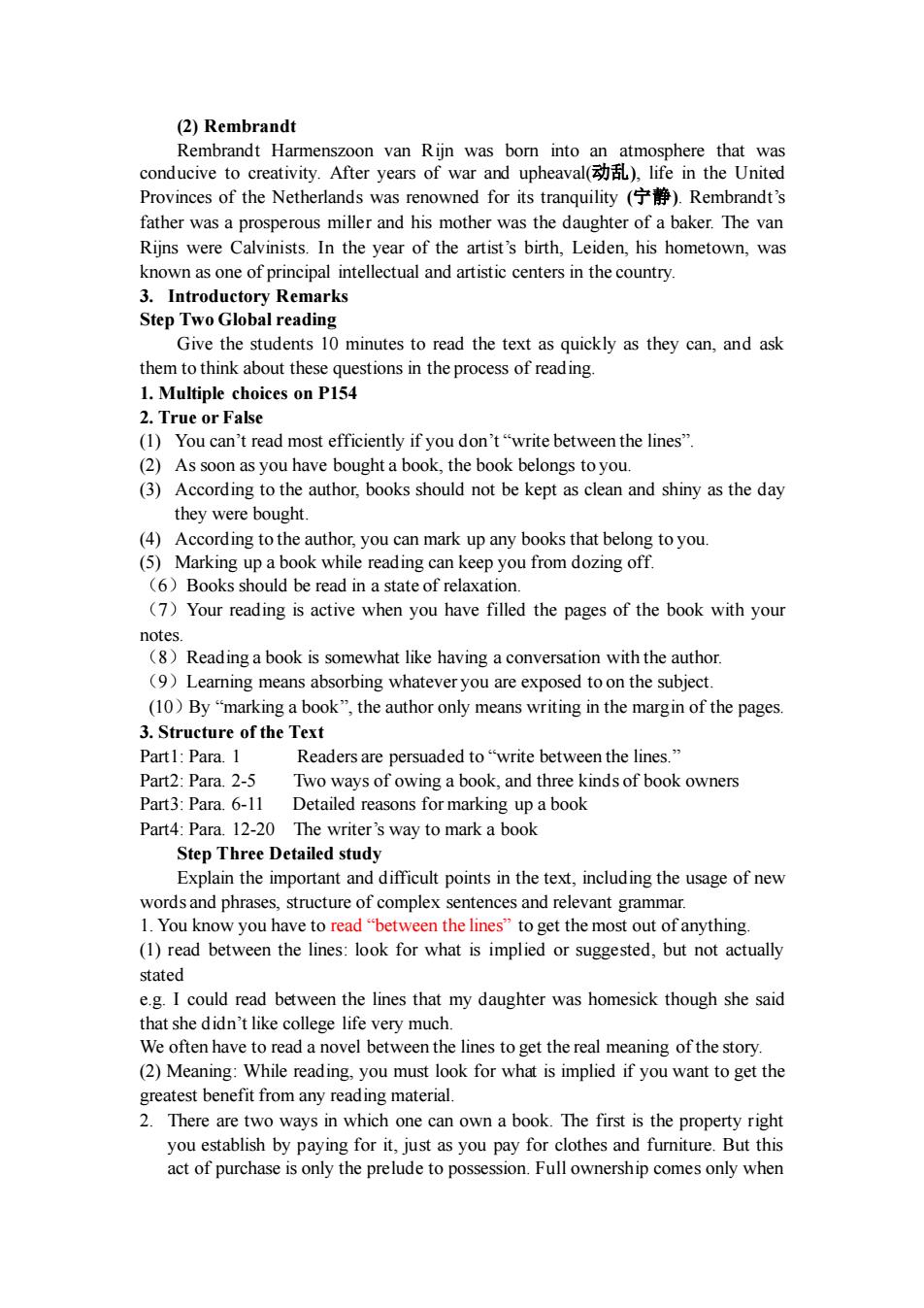
(2)Rembrandt Rembrandt Harmen nd upheava 动乱) of the Netherlands was renowned for its trangquility)Re reativity father was a prosperous miller and his mother was the daughter of a baker.The van Riins were Calvinists.In the vear of the artist's birth.Leiden his hometown.was stic centers in the country tory Remarks Step Two Global reading Give the students 10 minutes to read the text as quickly as they can,and ask them to think about these questions in the process of reading. 1.Multiple choices on P154 2.True or Fale (1)You can't read most efficiently if you don't"write between the lines" (2)As soon as you have bought a book,the book belongs to you. (3)According to the author,books should not be kept as clean and shiny as the day they were bought 4 cording to e author. you in mark up any books that belon g to you (⑤Marking upa ok wh reading ca keep you from dozing of 6 Books should be read in a state of relaxation (7)Your reading is active when you have filled the pages of the book with your notes (8)Reading a book is somewhat like having a conversation with the author. (9Leaming means absorbing whatever you are exposed to on the subject (10By"marking a book",the author only means writing in the margin of the pages 3.Structure of the Text Part1 Para 1 Readers are persuaded to"write between the lines" Part2:Para 2-5 Two ways of owing a book,and three kinds of book owners Part3 Para 6-11 Detailed ns for arkin up a book Part4:Para.12-20 The writer's way to mark a book Step Three Detailed study Explain the important and difficult points in the text,including the usage of new words and phrases.structure of complex sentences and relevant grammar. 1.You know you have to readbetween the lines"to get the most out of anything (1)read between the lines: look for what is implied or suggested,but not actually stated e.g.I could read between the lines that my daughter was homesick though she said that she didn't like college life very much. We often have to read a novel between the lines to get the real meaning of the story. (2)Mea ing:While reading, you mus st look for wha is impied if you want to get the material. 2.There are two ways in which one can own a book.The first is the property right you establish by paying for it,just as you pay for clothes and fumniture.But this act of purchase is only the prelude to possession.full ownership comes only when
(2) Rembrandt Rembrandt Harmenszoon van Rijn was born into an atmosphere that was conducive to creativity. After years of war and upheaval(动乱), life in the United Provinces of the Netherlands was renowned for its tranquility (宁静). Rembrandt’s father was a prosperous miller and his mother was the daughter of a baker. The van Rijns were Calvinists. In the year of the artist’s birth, Leiden, his hometown, was known as one of principal intellectual and artistic centers in the country. 3. Introductory Remarks Step Two Global reading Give the students 10 minutes to read the text as quickly as they can, and ask them to think about these questions in the process of reading. 1. Multiple choices on P154 2. True or False (1) You can’t read most efficiently if you don’t “write between the lines”. (2) As soon as you have bought a book, the book belongs to you. (3) According to the author, books should not be kept as clean and shiny as the day they were bought. (4) According to the author, you can mark up any books that belong to you. (5) Marking up a book while reading can keep you from dozing off. (6)Books should be read in a state of relaxation. (7)Your reading is active when you have filled the pages of the book with your notes. (8)Reading a book is somewhat like having a conversation with the author. (9)Learning means absorbing whatever you are exposed to on the subject. (10)By “marking a book”, the author only means writing in the margin of the pages. 3. Structure of the Text Part1: Para. 1 Readers are persuaded to “write between the lines.” Part2: Para. 2-5 Two ways of owing a book, and three kinds of book owners Part3: Para. 6-11 Detailed reasons for marking up a book Part4: Para. 12-20 The writer’s way to mark a book Step Three Detailed study Explain the important and difficult points in the text, including the usage of new words and phrases, structure of complex sentences and relevant grammar. 1. You know you have to read “between the lines” to get the most out of anything. (1) read between the lines: look for what is implied or suggested, but not actually stated e.g. I could read between the lines that my daughter was homesick though she said that she didn’t like college life very much. We often have to read a novel between the lines to get the real meaning of the story. (2) Meaning: While reading, you must look for what is implied if you want to get the greatest benefit from any reading material. 2. There are two ways in which one can own a book. The first is the property right you establish by paying for it, just as you pay for clothes and furniture. But this act of purchase is only the prelude to possession. Full ownership comes only when
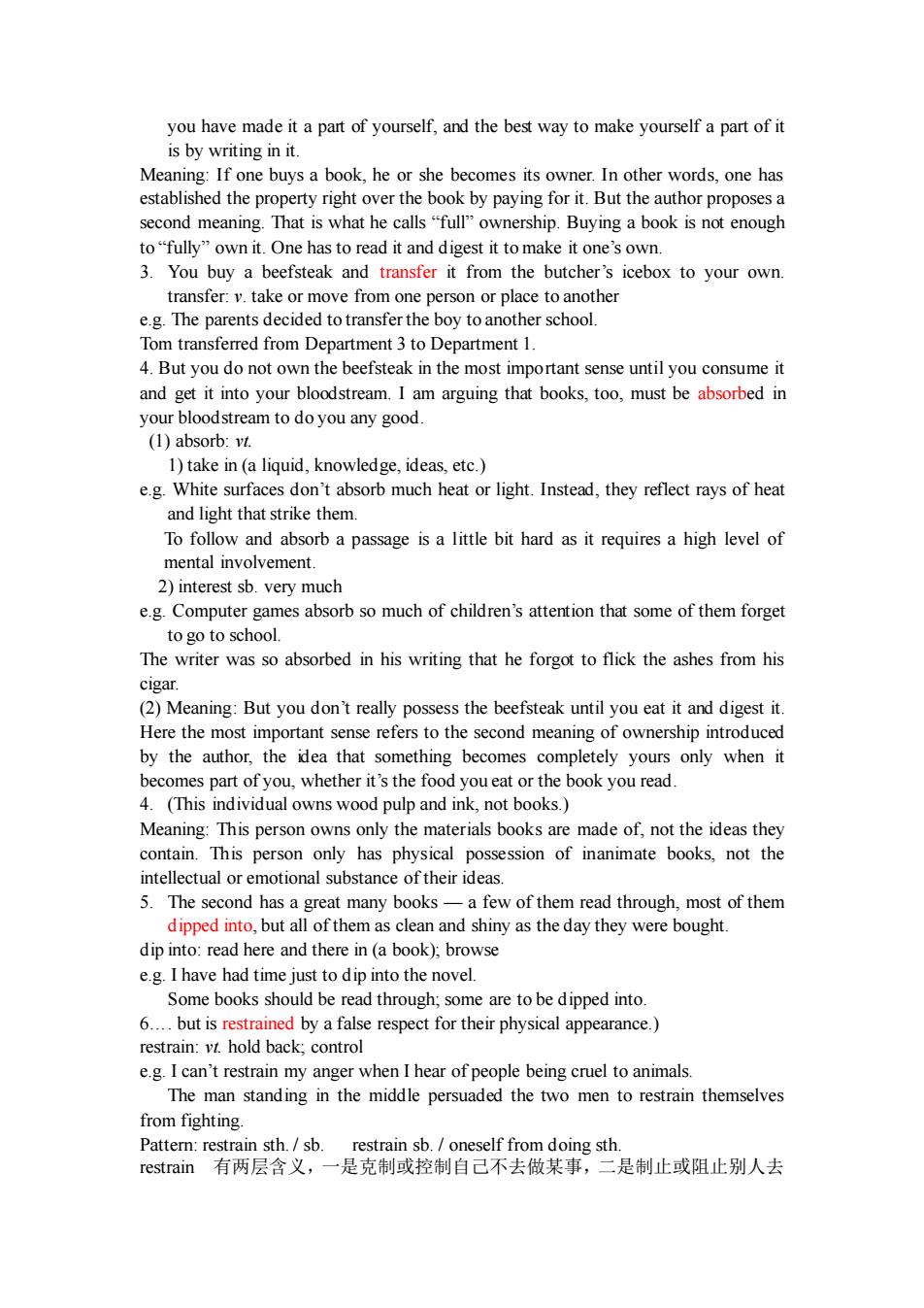
you have made it a part of yourself,and the best way to make yourself a part of it is by writingnt Meaning:If one buys a book,he or she becomes its owner.In other words.one has established the property right over the book by paying for it.But the author proposes a second meaning.That is what he calls"full"ownership.Buying a book is not enough to"fully"own it.One has to read it and digest it to make it one's own. 3.You buy a beefsteak and transfer it from the butcher's icebox to your own transfer:v.take or move from one person or place to another e.g.The parents decided to transfer the boy to another school. Tom transferred from Department 3 to Department 1. 4.But you do not own the beefsteak in the most important sense until you consume it and get it into your bloodstream.I am arguing that books,too must be absorbed in your bloodstream to do you any good (1)absorb:vt 1)take in(a liquid,knowledge,ideas,etc.) e.g White surfaces don't absorb much heat or light.Instead,they reflect rays of heat and light that strike them mental involvement 2)interest sb.very much e.g.Computer games absorb so much of children's attention that some of them forget to go to school. The writer was so absorbed in his writing that he forgot to flick the ashes from his (2)Meaning:But you don't really possess the beefsteak until you eat it and digest it. Here the most important sense refers to the second meaning of ownership introduced by the author.the idea that something becomes completely vours only when it art of u,whether it's the food you eat or the book you re ad 4.(This in d owns od pulp and ink,not books.) Meaning:This person owns only the materials books are made of,not the ideas they contain.This person only has physical possession of inanimate books,not the intellectual or emotional substance of their ideas. 5.The second has a great many books-a few of them read through,most of them pped into but all of the s clea and shiny as the day they were bought dip into:read here and there in(a book):browse e.g.I have had time just to dip into the novel. Some books should be read through:some are to be dipped into. 6..but is restrained by a false respect for their physical appearance.) estrain v hold back control my anger when Ihear being The man standing in the middle persuaded the two men to restrain themselves from fighting. Pattern:restrain sth./sb. restrain sb./oneself from doing sth restrain有两层含义,一是克制或控制自己不去做某事,二是制止或阻止别人去
you have made it a part of yourself, and the best way to make yourself a part of it is by writing in it. Meaning: If one buys a book, he or she becomes its owner. In other words, one has established the property right over the book by paying for it. But the author proposes a second meaning. That is what he calls “full” ownership. Buying a book is not enough to “fully” own it. One has to read it and digest it to make it one’s own. 3. You buy a beefsteak and transfer it from the butcher’s icebox to your own. transfer: v. take or move from one person or place to another e.g. The parents decided to transfer the boy to another school. Tom transferred from Department 3 to Department 1. 4. But you do not own the beefsteak in the most important sense until you consume it and get it into your bloodstream. I am arguing that books, too, must be absorbed in your bloodstream to do you any good. (1) absorb: vt. 1) take in (a liquid, knowledge, ideas, etc.) e.g. White surfaces don’t absorb much heat or light. Instead, they reflect rays of heat and light that strike them. To follow and absorb a passage is a little bit hard as it requires a high level of mental involvement. 2) interest sb. very much e.g. Computer games absorb so much of children’s attention that some of them forget to go to school. The writer was so absorbed in his writing that he forgot to flick the ashes from his cigar. (2) Meaning: But you don’t really possess the beefsteak until you eat it and digest it. Here the most important sense refers to the second meaning of ownership introduced by the author, the idea that something becomes completely yours only when it becomes part of you, whether it’s the food you eat or the book you read. 4. (This individual owns wood pulp and ink, not books.) Meaning: This person owns only the materials books are made of, not the ideas they contain. This person only has physical possession of inanimate books, not the intellectual or emotional substance of their ideas. 5. The second has a great many books — a few of them read through, most of them dipped into, but all of them as clean and shiny as the day they were bought. dip into: read here and there in (a book); browse e.g. I have had time just to dip into the novel. Some books should be read through; some are to be dipped into. 6…. but is restrained by a false respect for their physical appearance.) restrain: vt. hold back; control e.g. I can’t restrain my anger when I hear of people being cruel to animals. The man standing in the middle persuaded the two men to restrain themselves from fighting. Pattern: restrain sth. / sb. restrain sb. / oneself from doing sth. restrain 有两层含义,一是克制或控制自己不去做某事,二是制止或阻止别人去
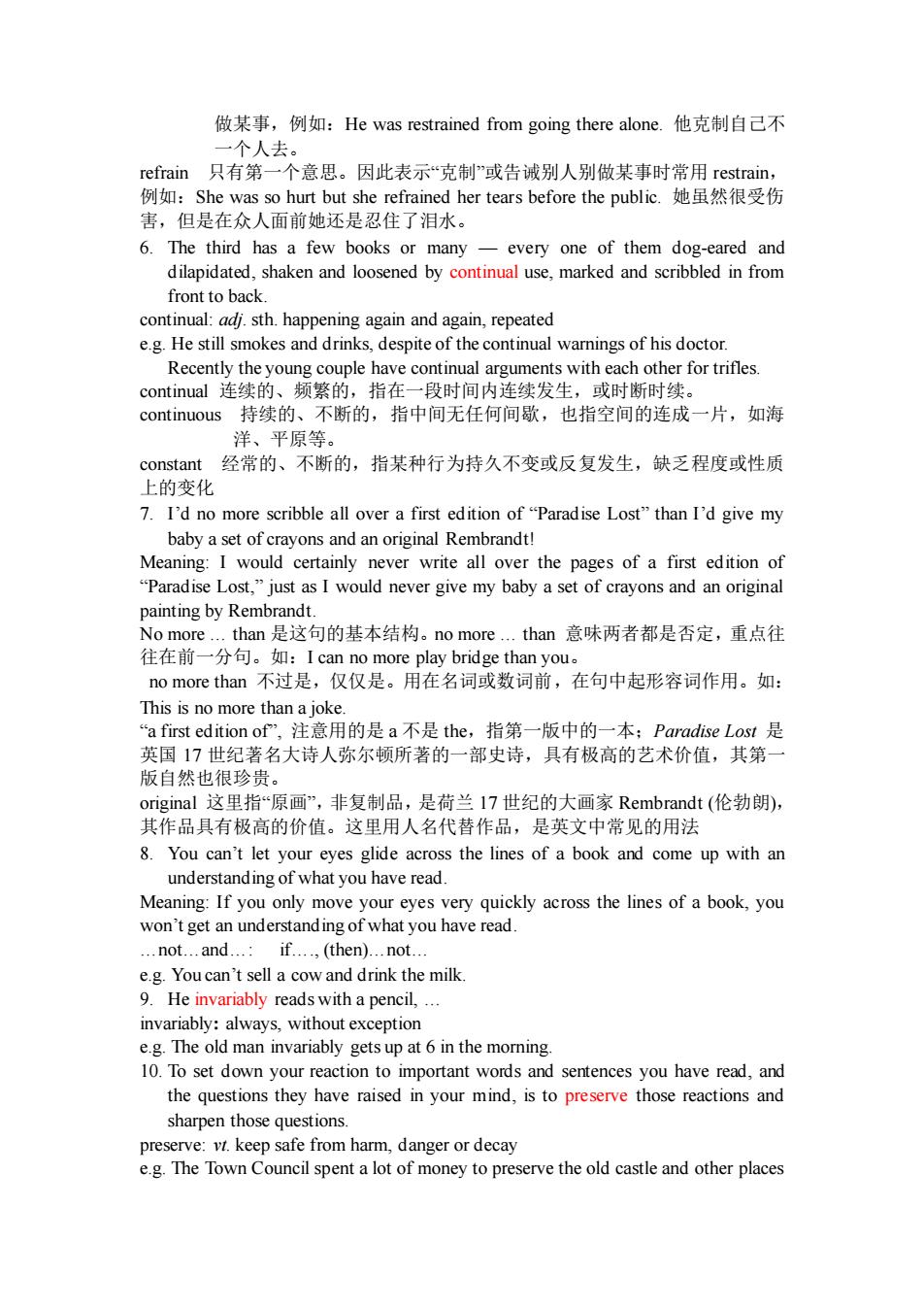
做某事,例如:He was restrained from going there alone..他克制自己不 个人夫 eain只有第一个意思。因此表示“克制”或告诚别人别做某事时常用rcsa 例如: She was s so hurt but she refra ined her tears before the public..她虽然很受伤 害,但是在众人面前她还是忍住了泪水。 6.The third has a few books or many-every one of them dog-eared and dilapidated,shaken and loosened by continual use,marked and scribbled in fror front to back continual:adj.sth.happening again and again,repeated e.g.He still smokes and drinks.despite of the continual warnings of his doctor. Recently the young couple have continual arguments with each other for trifles. continual连续的、频繁的,指在一段时间内连续发生,或时断时续。 continuous持续的、不断的,指中间无任何间歇,也指空间的连成一片,如海 constant 经常的、不断的,指某种行为持久不变或反复发生,缺乏程度或性质 上的变化 7.I'd no more scribble all over a first edition of"Paradise Lost"than I'd give my baby a brandt! uld certainlyita over the pages of a first edition of Meaning:I wo "Paradise Lost,"just as I would never give my baby a set of crayons and an original painting by Rembrandt. No more...than是这句的基本结构。no more...than意味两者都是否定,重点往 往在前一分句。如:I can no more play bridge than you no more than不过是,仅仅是。用在名词或数词前,在句中起形容词作用。如: This is no more than a joke a first edition of,注意用的是a不是the,指第一版中的一本;Paradise Lost是 英国17世纪著名大诗人弥尔顿所著的一部史诗,具有极高的艺术价值,其第 版自然也很珍贵。 riginal这里指“原画”,非复制品,是荷兰17世纪的大画家Rembrandt(伦勃朝) 其作品具有极高的价值。这里用人名代替作品,是英文中常见的用法 8.You can't let your eyes glide across the lines of a book and come up with an understanding of what you have read. Meaning:If you only move your eyes very quickly across the lines of a book,you won't get an understanding of what you have read. ..and. if.. (then). not e.g.You can't sell a cow and drink the milk 9.He invariably reads with a pencil, invariably:always.without exception e.g.The old man invariably gets up at 6 in the moming 10.To set rreaction t important s and sentences you have read,ard the questions they have raised in your mind,is to preserve those reactions and sharpen those questions. preserve:vt.keep safe from harm,danger or decay e.g.The Town Council spent a lot of money to preserve the old castle and other places
做某事,例如:He was restrained from going there alone. 他克制自己不 一个人去。 refrain 只有第一个意思。因此表示“克制”或告诫别人别做某事时常用 restrain, 例如:She was so hurt but she refrained her tears before the public. 她虽然很受伤 害,但是在众人面前她还是忍住了泪水。 6. The third has a few books or many — every one of them dog-eared and dilapidated, shaken and loosened by continual use, marked and scribbled in from front to back. continual: adj. sth. happening again and again, repeated e.g. He still smokes and drinks, despite of the continual warnings of his doctor. Recently the young couple have continual arguments with each other for trifles. continual 连续的、频繁的,指在一段时间内连续发生,或时断时续。 continuous 持续的、不断的,指中间无任何间歇,也指空间的连成一片,如海 洋、平原等。 constant 经常的、不断的,指某种行为持久不变或反复发生,缺乏程度或性质 上的变化 7. I’d no more scribble all over a first edition of “Paradise Lost” than I’d give my baby a set of crayons and an original Rembrandt! Meaning: I would certainly never write all over the pages of a first edition of “Paradise Lost,” just as I would never give my baby a set of crayons and an original painting by Rembrandt. No more … than 是这句的基本结构。no more … than 意味两者都是否定,重点往 往在前一分句。如:I can no more play bridge than you。 no more than 不过是,仅仅是。用在名词或数词前,在句中起形容词作用。如: This is no more than a joke. “a first edition of”, 注意用的是 a 不是 the,指第一版中的一本;Paradise Lost 是 英国 17 世纪著名大诗人弥尔顿所著的一部史诗,具有极高的艺术价值,其第一 版自然也很珍贵。 original 这里指“原画”,非复制品,是荷兰 17 世纪的大画家 Rembrandt (伦勃朗), 其作品具有极高的价值。这里用人名代替作品,是英文中常见的用法 8. You can’t let your eyes glide across the lines of a book and come up with an understanding of what you have read. Meaning: If you only move your eyes very quickly across the lines of a book, you won’t get an understanding of what you have read. …not…and…: if…., (then)…not… e.g. You can’t sell a cow and drink the milk. 9. He invariably reads with a pencil, … invariably: always, without exception e.g. The old man invariably gets up at 6 in the morning. 10. To set down your reaction to important words and sentences you have read, and the questions they have raised in your mind, is to preserve those reactions and sharpen those questions. preserve: vt. keep safe from harm, danger or decay e.g. The Town Council spent a lot of money to preserve the old castle and other places
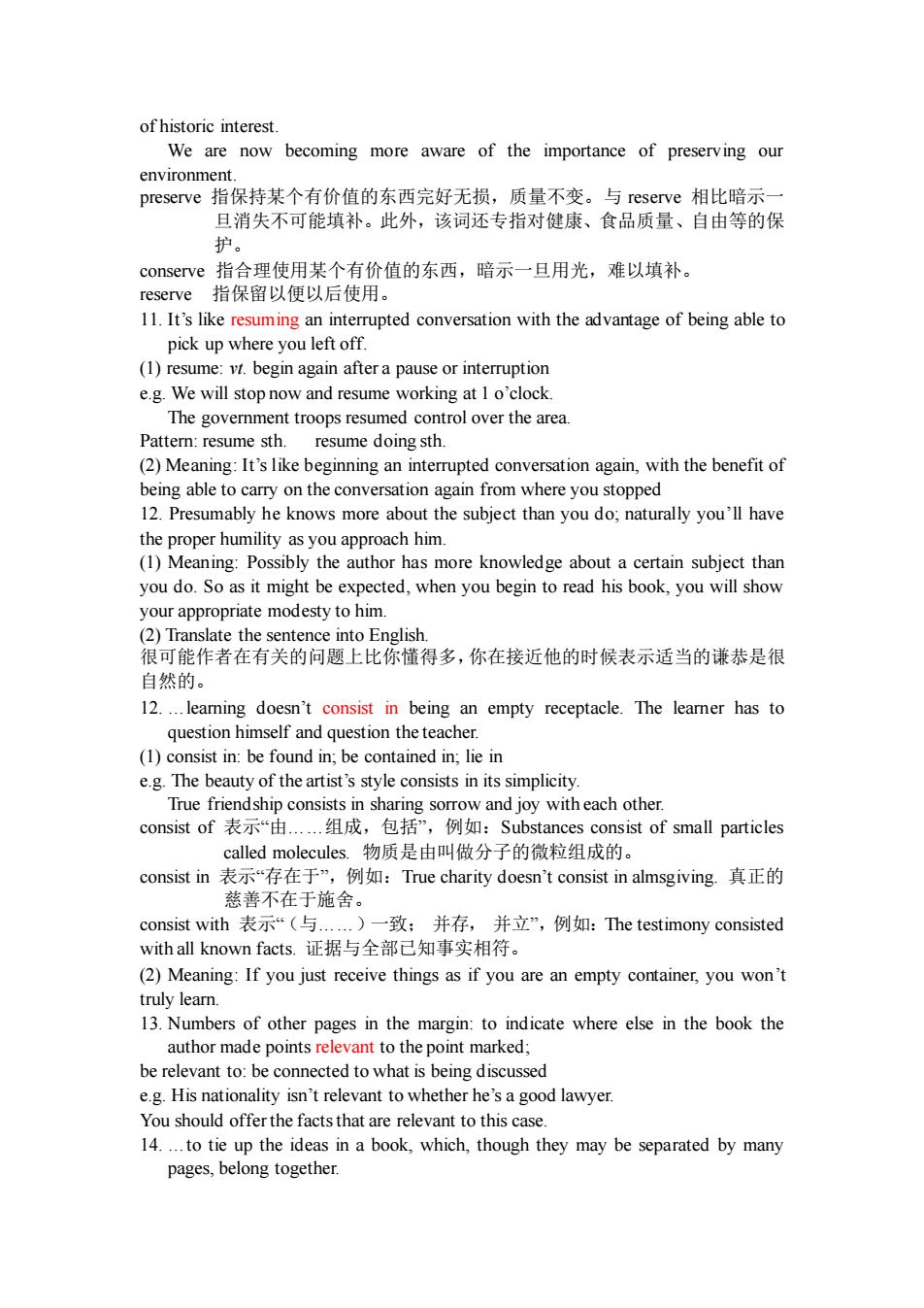
ofhistoric interest We are now becoming more aware of the importance of preserving our environment preserve指保持某个有价值的东西完好无损,质量不变。与reserve相比暗示 旦消失不可能填补。此外,该词还专指对健康、食品质量、自由等的保 护。 conserve指合理使用某个有价值的东西,暗示一旦用光,难以填补。 reserve 指保留以便以后使用 11.It's like resuming an interrupted conversation with the advantage of being able to pick up where you left off (1)resume:vt.begin again after a pause or interruption e.g.We will stop now and resume working at 1 o'cloc The government troops resumed control over the area Pattern:resume sth resume doing sth. (2)Meaning:It's like beginning an interrupted conversation again,with the benefit of conthe co from where you 12.Presumably he knows more about the subject than you do; the proper humil syou approach him. (1)Meaning:Possibly the author has more knowledge about a certain subject than you do.So as it might be expected,when you begin to read his book,you will show your appropriate modesty to him. (2)Translate the sentence into english 很可能作者在有关的问题上比你懂得多,你在接近他的时候表示适当的谦恭是很 自然的。 12....leaming doesn't consist in being an empty receptacle.The learner has to question himself and question the teacher. (1)consist in:be found in:be contained in:lie in e.g.The beauty of the artist's style consists in its simplicity e fr consists ng sor w an joy witheach other 组成 Substances consist of small particles called molecules.物质是由叫做分子的微粒组成的。 consist in表示“存在于”,例如:True charity doesn't consist in almsgiving.真正的 慈善不在于施舍。 consist with表示“(与. )一致:并存,并立”,例如:The testimony consisted with all known facts.证据与全部己知事实相符。 (2)Meaning:If you just receive things as if you are an empty container,you won't truly learn 13.Numbers of other pages in the margin:to indicate where else in the book the autho nade points r ant to the point marked e.g.His nationality isn't relevant to whether he's a good lawyer. You should offer the facts that are relevant to this case. 14....to tie up the ideas in a book,which,though they may be separated by many pages,belong together
of historic interest. We are now becoming more aware of the importance of preserving our environment. preserve 指保持某个有价值的东西完好无损,质量不变。与 reserve 相比暗示一 旦消失不可能填补。此外,该词还专指对健康、食品质量、自由等的保 护。 conserve 指合理使用某个有价值的东西,暗示一旦用光,难以填补。 reserve 指保留以便以后使用。 11. It’s like resuming an interrupted conversation with the advantage of being able to pick up where you left off. (1) resume: vt. begin again after a pause or interruption e.g. We will stop now and resume working at 1 o’clock. The government troops resumed control over the area. Pattern: resume sth. resume doing sth. (2) Meaning: It’s like beginning an interrupted conversation again, with the benefit of being able to carry on the conversation again from where you stopped 12. Presumably he knows more about the subject than you do; naturally you’ll have the proper humility as you approach him. (1) Meaning: Possibly the author has more knowledge about a certain subject than you do. So as it might be expected, when you begin to read his book, you will show your appropriate modesty to him. (2) Translate the sentence into English. 很可能作者在有关的问题上比你懂得多,你在接近他的时候表示适当的谦恭是很 自然的。 12. …learning doesn’t consist in being an empty receptacle. The learner has to question himself and question the teacher. (1) consist in: be found in; be contained in; lie in e.g. The beauty of the artist’s style consists in its simplicity. True friendship consists in sharing sorrow and joy with each other. consist of 表示“由……组成,包括”,例如:Substances consist of small particles called molecules. 物质是由叫做分子的微粒组成的。 consist in 表示“存在于”,例如:True charity doesn’t consist in almsgiving. 真正的 慈善不在于施舍。 consist with 表示“(与……)一致; 并存, 并立”,例如:The testimony consisted with all known facts. 证据与全部已知事实相符。 (2) Meaning: If you just receive things as if you are an empty container, you won’t truly learn. 13. Numbers of other pages in the margin: to indicate where else in the book the author made points relevant to the point marked; be relevant to: be connected to what is being discussed e.g. His nationality isn’t relevant to whether he’s a good lawyer. You should offer the facts that are relevant to this case. 14. …to tie up the ideas in a book, which, though they may be separated by many pages, belong together
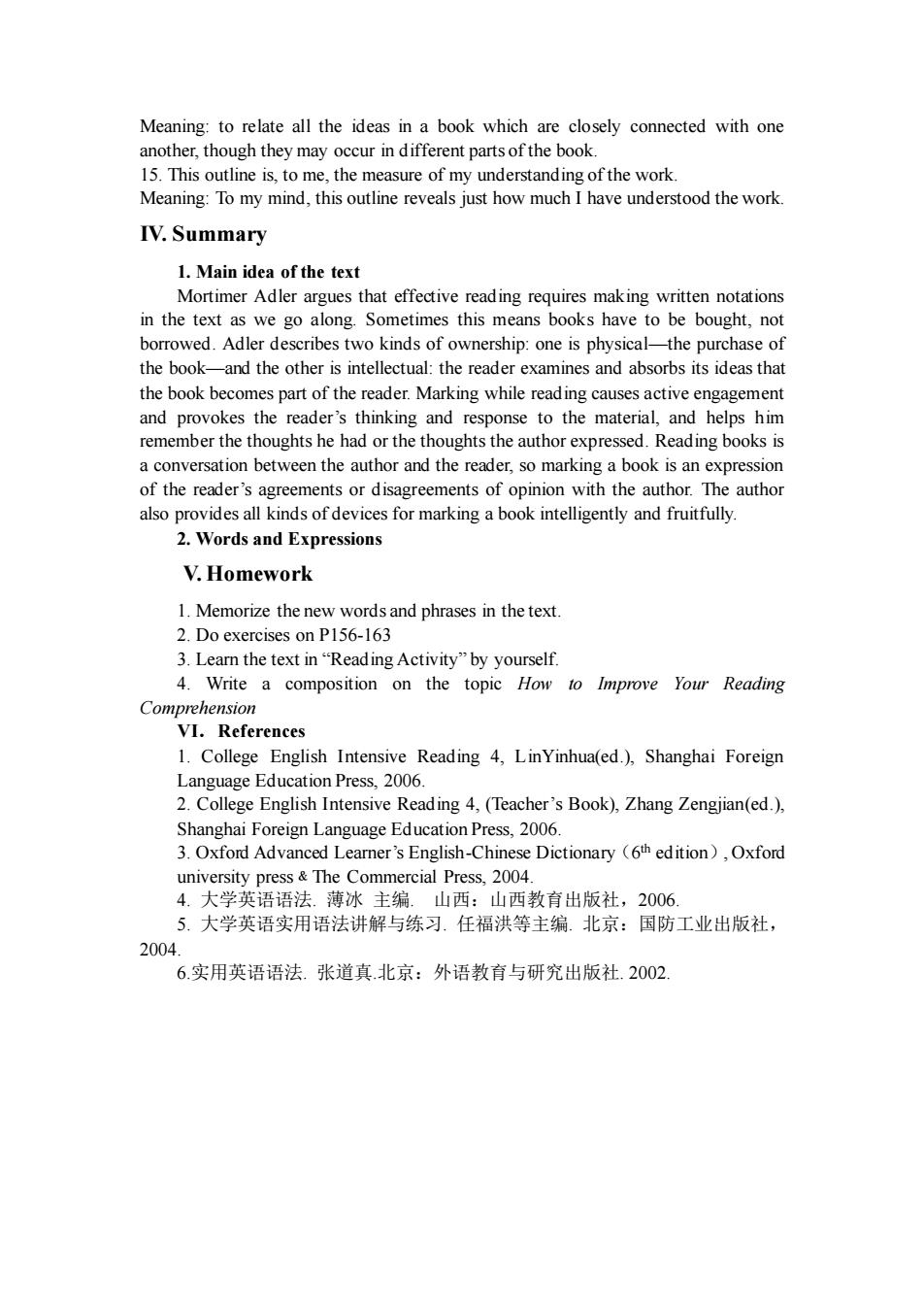
Meaning:to relate all the ideas in a book which are closely connected with one nothe r,thou gh they may in dfferent parts ofthe book 15..the measure of myunderstanding of the work. Meaning:To my mind,this outline reveals just how much I have understood the work. IV.Summary 1.Main idea of the text Mortimer Adler argues that effective reading requires making written notation in the text as we go along.Sometimes this means books have to be bought,not borrowed.Adler describes two kinds of ownership:one is physical-the purchase of the book-and the other is intellectual:the reader examines and absorbs its ideas that the book becomes part of the reader.Marking while reading causes active engagement and provokes the and helps him remember the thoughts he had or the thoughts the author expressed.Reading books is a conversation between the author and the reader,so marking a book is an expression of the reader's agreements or disagreements of opinion with the author.The author also provides all kinds of devices for marking a book intelligently and fruitfully. 2.Words and Expression V.Homework 1.Memorize the new words and phrases in the text. 2.Do exercises on P156-163 3.Leamn the text in"Reading Activity"by yourself. 4.Write a composition on the topic How to Improve Your Reading Comprehension VI.References 1.College English Intensive Reading 4,LinYinhua(ed.),Shanghai Foreign Language education Press 2006 2.College English Intensive Reading 4.(Teacher's Book).Zhang Zengjian(ed.). Shanghai Foreign Language Education Press,2006. 3.Oxford Advanced Learner's English-Chinese Dictionary (6th edition),Oxford university press The Commercial Press,2004. 4.大学英语语法.薄冰主编.山西:山西教有出版社,2006. .大学英语实用语法讲解与练习.任福洪等主编。北京:国防工业出版社, 2004 6.实用英语语法.张道真.北京:外语教有与研究出版社.2002
Meaning: to relate all the ideas in a book which are closely connected with one another, though they may occur in different parts of the book. 15. This outline is, to me, the measure of my understanding of the work. Meaning: To my mind, this outline reveals just how much I have understood the work. IV. Summary 1. Main idea of the text Mortimer Adler argues that effective reading requires making written notations in the text as we go along. Sometimes this means books have to be bought, not borrowed. Adler describes two kinds of ownership: one is physical—the purchase of the book—and the other is intellectual: the reader examines and absorbs its ideas that the book becomes part of the reader. Marking while reading causes active engagement and provokes the reader’s thinking and response to the material, and helps him remember the thoughts he had or the thoughts the author expressed. Reading books is a conversation between the author and the reader, so marking a book is an expression of the reader’s agreements or disagreements of opinion with the author. The author also provides all kinds of devices for marking a book intelligently and fruitfully. 2. Words and Expressions V. Homework 1. Memorize the new words and phrases in the text. 2. Do exercises on P156-163 3. Learn the text in “Reading Activity” by yourself. 4. Write a composition on the topic How to Improve Your Reading Comprehension VI.References 1. College English Intensive Reading 4, LinYinhua(ed.), Shanghai Foreign Language Education Press, 2006. 2. College English Intensive Reading 4, (Teacher’s Book), Zhang Zengjian(ed.), Shanghai Foreign Language Education Press, 2006. 3. Oxford Advanced Learner’s English-Chinese Dictionary(6 th edition), Oxford university press﹠The Commercial Press, 2004. 4. 大学英语语法. 薄冰 主编. 山西:山西教育出版社,2006. 5. 大学英语实用语法讲解与练习. 任福洪等主编. 北京:国防工业出版社, 2004. 6.实用英语语法. 张道真.北京:外语教育与研究出版社. 2002